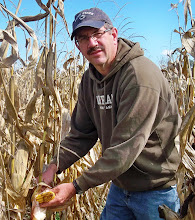From Matt Ryan, Penn State Crop and Soil Sciences
Over the past several years, interest in local food has prompted many bakeries in the northeast to find locally grown wheat flour for baking. Many famers in Pennsylvania already grow soft red winter wheat, which is high is starch and is good for pastry flour and making pretzels. However, hard red wheat is high in protein and gluten, and is considered to be better for bread flour. According to Elizabeth Dyck at Cornell University Frederick
- Frederick – organic soft white (Lakeview Organic Grain)
- USG 3770 – untreated conventional soft red (UniSouth Genetics)
- AH 9121– untreated conventional soft red (American Hybrids)
- AH 9915 – untreated conventional soft red (American Hybrids)
- WS 44 – organic soft red (Welter)
- FS801 – conventional soft red (Growmark)
- GH 4532 – organic soft red (Great Harvest)
- AH 9643 – untreated conventional soft red (American Hybrids)
Wheat was sown on October 11, 2010 at the Russell E. Larson Agricultural Research farm by Mark Antle and Dave Sandy. Crop vigor was evaluated on May 5, 2011 using a visual rating scale (1 = poor stand and 10 = excellent stand).




No comments:
Post a Comment